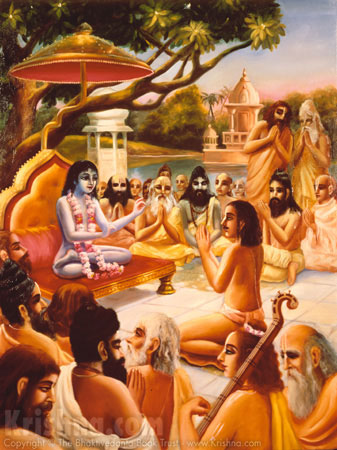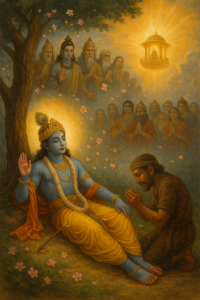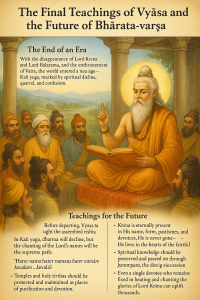The Birth of a Divine Protector
After the departure of Lord Kṛṣṇa and the Pāṇḍavas, the sacred responsibility of ruling Bhārata-varṣa fell upon Mahārāja Parīkṣit, the grandson of Arjuna and the son of Abhimanyu and Uttarā.
His very birth was extraordinary. While still in the womb, Aśvatthāmā launched a brahmāstra weapon to destroy him, seeking vengeance after the fall of Duryodhana. But the Supreme Lord Śrī Kṛṣṇa personally entered the womb and shielded the unborn child, saving his life and leaving behind a divine mark on his body.
Because the brāhmaṇas saw him constantly “parīkṣaṇa” (examining) the world with curiosity and devotion after his birth—wondering who it was that had saved him—they named him Parīkṣit, “the examiner.”
Parīkṣit’s Rule of Dharma
Upon being crowned, Mahārāja Parīkṣit ruled with the same spirit as his grandfathers: upholding righteousness (dharma), truth, charity, and protection of the innocent.
He performed aśvamedha sacrifices, honored the sages, and ensured the people of his kingdom were protected from the growing influence of Kali-yuga, the age of quarrel and hypocrisy.
Parīkṣit personally toured the kingdom, inspecting each region and ensuring that dharma was not compromised by greed, deception, or injustice.
The Encounter with Dharma and the Bull
One day, while riding his chariot, Parīkṣit came upon a shocking scene:
- A bull stood trembling on one leg—representing the remaining pillar of dharma: truth.
- Nearby stood a cruel figure, the personification of Kali, dressed as a king, beating the bull and the cow, who symbolized Mother Earth.
The bull’s legs—austerity, cleanliness, compassion, and truth—had been broken, leaving him barely standing.
Outraged, Parīkṣit raised his sword.
“O wicked one! How dare you strike dharma in my kingdom? I shall punish you!”
The personification of Kali trembled and fell at the king’s feet, begging:
“O noble king, I am Kali. I have entered this world by fate. Grant me a place to live, for I am also part of the Lord’s design.”
Parīkṣit’s Wisdom and Mercy
Understanding that every yuga has its dharma, Parīkṣit granted Kali limited places to dwell—places where adharma thrives:
- Gambling houses
- Taverns (drinking)
- Brothels (illicit sex)
- Places of animal slaughter
- And finally, where gold is hoarded with greed
Thus, he confined Kali’s influence to places where people voluntarily choose degradation. He warned his citizens: “Avoid these places, and Kali will not touch you.”
This wise and merciful action of Parīkṣit preserved the sanctity of dharma at the dawn of Kali-yuga.
Preparation for Departure
Later, by divine arrangement, Parīkṣit was cursed to die in seven days by the bite of a snake-bird, Takṣaka, due to a minor offense committed against a sage in a moment of fatigue.
Yet he accepted this as the Lord’s will and chose to spend his final days in absorbed hearing of the Śrīmad Bhāgavatam, spoken by Śukadeva Gosvāmī on the banks of the Ganges.
This event became the Bhāgavata-saptāha, and its teachings became the torchlight for bhakti in the age of Kali.
Lessons to Be Learned:
- Parīkṣit shows how a true king rules by dharma, not fear.
- Even when power is in one’s hands, forgiveness and wisdom must prevail, as in his dealing with Kali.
- The age of Kali brings many dangers, but devotion to Kṛṣṇa and avoidance of sinful habits can protect one.
- Hearing Śrīmad Bhāgavatam sincerely purifies the heart and prepares one for liberation.
- The end of life should be used not in fear, but in remembrance of the Lord.
Origin of the Story: Harivaṁśa Purāṇa – Viṣṇu-parva and aligned context from Bhāgavata Mahāpurāṇa, Canto 1



